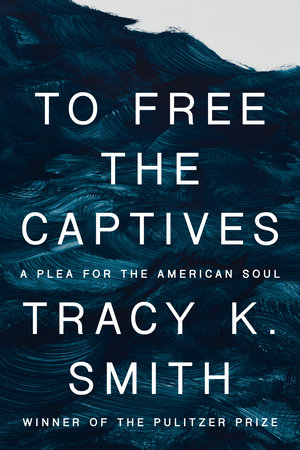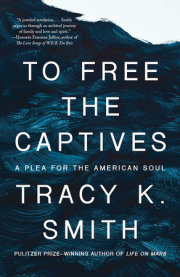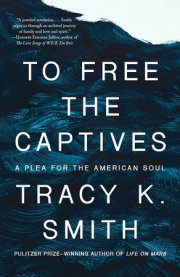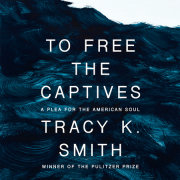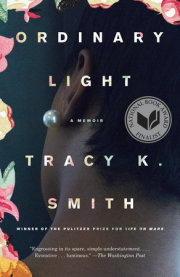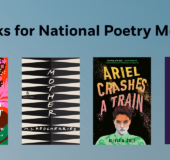From the Pulitzer Prize-winning poet: a stunning meditation on ritual and collectiveness that explores how older forms of inquiry—from song to prayer to ways of public gathering—might help us all survive violent times and address America’s shared history.
In 2020, heartsick from constant assaults on Black life, Tracy K. Smith wondered if a sense of collective enterprise could return to American life. Meditating and praying, writing and remembering, she communed with ancestors and her family’s past. In doing so, she began to wonder if these forms of ritual were in fact exactly what was missing from how America addressed race and itself. In this tender and profoundly urgent book, Smith draws on several avenues of thinking—personal, historical, and spiritual—to create a radically uplifting work about how such practices could inform our individual lives, as well as that of the nation.
To Free the Captives begins this journey by assembling a new vocabulary of American life. Parsing the difference between the Free and the Freed, of the near and the soon—soon as defined in black spirituals—she etches a clear description of where we are at this point, four hundred years into the American experiment. Pulling from her own, recent intimate losses, Smith draws us away from the broken comfort of easy certainties to the lip of what is logical and makes a compelling argument for the importance of faith—of spiritual language and practice—in confronting America’s past.
To Free the Captives invites the reader to a gathering of spirits, as Smith defines it. Calling upon her elders, from the poet Lucille Clifton to the wisdom of her late father, she forms a clear-eyed vision of American life and of Black life born of elegy and pride, an idea of a nation in which decency is possible so long as we admit truly what we are and have been. In the context of deep polarization and continued violence, this is a strikingly hopeful book, vulnerable, clear-eyed about the work that remains to be done, yet determined to see what is yet possible when the spirit is called forth.
“Ours is a great nation, one standing in the need of prayer, like the old song says. But Tracy K. Smith’s To Free the Captives: A Plea for the American Soul is a jeweled revelation—a good Word, a solace—for our troubled times in this troubled place. Smith urges us through an archival journey of family and love and spirit, and retains an always-persuasive hope: that this land can and will sing possibility—for all of us.” —Honorée Fanonne Jeffers, author of The Love Songs of W.E.B. Du Bois
“A profound, private, yet meticulous excavation of the inexplicable mysteries of Black intimacy. Smith is a master at revealing that fine shimmering line between imagination and memory. To Free the Captives is such a book. It is a revelation of interiority, pulsating with astute, attentive, seriousness. ‘Is love an institution?’ Smith asks in these pages. Was generations of black love, above all else, that propulsive force behind our survival and thriving? This book is an excavation where love hides within history—or better put, this books examines how the quiet inimitable force we call ‘Black love’ made American history possible. Word by word, Smith sparks the ground with her blade, then allows us to follow her below into the sacred world of the unspoken. But this isn’t a book about hidden secrets. Instead, it’s a shimmering articulation of all the resplendent rich silences American history has yet to learn how to articulate. And what’s truly remarkable is that—somehow—Smith has discovered a way to use language to speak resplendently about human struggle and tenacity for which most of us have no words. Most of all this book is about how love can humble history. Love—dark, strong, ornate—and made of iron. Something that can last for lifetimes. And does.” —Robin Coste Lewis, author of To the Realization of Perfect Helplessness
“To Free the Captives is Tracy K. Smith’s most vulnerable and powerful book to date. Smith reflects on young adulthood to motherhood with unparalleled lyricism, hard-won wisdom, and a bracing honesty that pierces my soul. Her memoir is both an ode and elegy to her family as well as a sobering reckoning of a country that murders Black lives with impunity. Every word is freighted with the gravity of grief and the sublime light of hope; every sentence sings. This important and revelatory memoir will inspire us all.” —Cathy Park Hong, author of Minor Feelings
“In To Free the Captives Tracy K. Smith faces the animal of American history armed with love, metaphor and enormous courage, and the results are wondrous. In writing the experience of being Black in America—and therefore being most intensely—she thinks her feelings, and feels her thoughts. There is no dissociation of sensibilities here, and clarity of poetry and the poetry of clarity mark every sentence and page in this book. The reigning feeling/thought in Smith’s writing is love, reminding me of what Hannah Arendt once wrote: ‘Love is the weight of the soul.’ To Free the Captives is a revelation, a seminal work of American literature.” —Aleksandar Hemon, author of The World and All That It Holds
“Tracy K. Smith is one of the most beautiful and profound writers of our time. I wept and laughed my way through these gorgeous pages. She teaches us how our beloved ancestors remain our protectors and guides, and how—in Black life—past and present merge in the persistence of injustice and the resilience of our ancestral legacies. The great human virtues: love, hope, and joy move through her narration of traveling through Mexico, Oakland, New England, New York, and multiple universities and relationships over the years, all the while sharing the revelations of her own beautiful multicultural Black life. You will love her story and understand much more about your own.” —Imani Perry, author of South to America
“In one sense, To Free the Captives is a grief-stricken lamentation for the dead. A vulnerable, honest look at a life lived in a country still struggling with its evils. Tracy K. Smith has also written a book for her children and for us. Hopeful, despite all that she sees and feels so deeply, that the freed will soon be truly free. Beautiful and haunting all at once. What a gift!” —Eddie S. Glaude Jr., author of Begin Again: James Baldwin’s America and Its Urgent Lessons for Our Own
“A unique intelligence guides the hand of Tracy K. Smith through the archives. It is an intelligence that is both fierce and composed; both compassionate, and unflinching. And if intelligence is a kind of light, this light is the kind that allows alchemy. Under its radiance, the violence of the archive becomes one of the most powerful meditations on history, time and the thread of ancestry that I have read.” —Valeria Luiselli, author of Lost Children Archive

